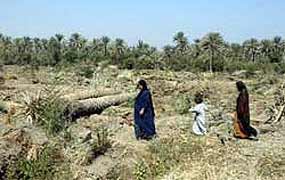World Crisis Web
News is just reaching the world of a new and brutal collective punishment practice adopted by the “liberating” forces in Iraq. Late last month, in the relatively quiet rural centre of the country, the conspicuous sound of jazz music from loudspeakers could be heard, as sunglasses-clad USA solders uprooted ancient groves of date palms, as well as orange and lemon orchards, belonging to the farming communities there. The tactic was part of a policy of collective punishment for farmers who fail to co-operate with the invaders by giving information about opposition activities in their area.

Beside the roads in Dhuluaya, the stumps of seventy-year-old palm trees today protrude from the brown earth, which once provided a modest income for the town?s inhabitants. And local women were yesterday seen bundling together remaining branches of uprooted orange and lemon trees, to carry back to their homes for firewood.
The scene at the time of the operation was, by all accounts, one of utter desperation. “Some women and children tried going into the fields to pick and salvage the fruit from destruction, but the American troops fired into the air to scare them off,” said one farmer. Children lay down in front of the bulldozers but were dragged away, according to eyewitnesses. When a reporter attempted to take a photograph of the bulldozers at work a soldier grabbed his camera and tried to smash it.
USA forces are unapologetic, if vague, about the new approach. Master Sergeant Robert Cargie, of the 4th Infantry Division, said “we cannot get specific on these operations”, but he added, “if an area is determined to be useful as an ambush point, we will seek to eliminate that as a threat.” Lieutenant Colonel Springman, a USA commander in the region, was quoted as saying, “we asked the farmers several times to stop the attacks, or to tell us who was responsible, but the farmers didn’t tell us.”
Mubarak Saleh, a farmer from the area, said that locals sent a delegation to the top USA official in town in a bid to settle the dispute. “We tried to make them stop destroying our fields or at least ask for compensation,” he said, “but all they said was: ‘When the resistance will stop, we will stop destroying the fields,’”
“They say resistance fighters could hide in the fields, but I tell you these are my fields and nobody goes into them. There are no attacks around here,” said one. Even if locals knew of the existence of opposition forces in the area, to tell the occupiers about the identity of guerrillas would be extremely dangerous for them and their families.

For Iraqis, the destruction of palm groves and fruit trees, which farmers said were feeding around five hundred people, is inexcusable. Islam strictly forbids the destruction of crops during wartime. Asked how much his destroyed orchard was worth, Nusayef Jassim said in a distraught voice: “It is as if someone cut off my hands, and you asked me how much my hands were worth.”
Sheikh Hussein Ali Saleh al-Jabouri, a member of a delegation that went to the Americans to try to settle the matter, said soldiers described what had happened as “a punishment of local people because ‘you know who is in the resistance and do not tell us’.” What the Israelis had done by way of collective punishment of Palestinians was now happening in Iraq, Sheikh Hussein added.
“We cannot benefit from the fruits anymore, so we will try to earn some money from charcoal,” explained Mohammad Saleh, amid the stone houses which were once shaded by the plantation. “The Americans - who claim they want to help us rebuild our country - are now destroying our trees and fruits. Tell me, what kind of civilised people destroy plants,” one aggrieved farmer shouted.
Khalil, a 35-year-old father of seven children, said: “I just lost 15 million dinars in dates and eight million dinars in oranges. This is a fortune here in Iraq and my only way of living,” A tall man standing behind him raised a warning finger and cautioned, “some people who lost their fields are begging, others are stealing cars, but now that we have nothing to do, maybe we will join the resistance. Is this what the Americans want?”